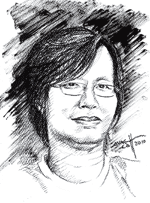Expecting the Worst, Hoping for Something
Burma’s controversial election, its first in 20 years, is only days away.
Most of the country’s pro-democracy groups say the election is “undemocratic and unnecessary.” The 37 political parties that have chosen to contest the polls say the election is “the only political alternative.” And many Burmese people say they are “not interested because it won’t bring about any real change.”
As for The Irrawaddy, we see that the election will be held while pro-democracy leader Aung San Suu Kyi remains under house arrest, more than 2,100 political prisoners remain in prison and some ethnic parties have been excluded from competing in the polls.
Therefore, we do not see this election as free and inclusive.
We also understand that the electoral laws issued by the military regime’s hand-picked Union Election Commission (EC) repress pro-democracy and ethnic parties while favoring the junta’s proxy party—the Union Solidarity and Development Party (USDP). In circumstances where the laws purportedly restrict all parties equally, the USDP simply ignores the law in full knowledge that there will be no repercussions.
 |
| Kyaw Zwa Moe is managing editor of the Irrawaddy magazine. He can be reached at [email protected]. |
We also know that the junta’s main motivation in holding this election is not to bring democracy to Burma, but to legitimize military domination in the country’s future political arena under the guise of a parliamentary form of government. This comes 20 years after the same generals who are running the 2010 election ignored the results of the 1990 election in which Aung San Suu Kyi’s National League for Democracy (NLD) won a landslide victory.
Therefore, we see this election as a sham.
We understand the motives of the opposition political parties that have chosen to contest the election, including pro-democracy parties such as the National Democratic Force—a breakaway party of the NLD—and the Democratic Party (Myanmar), as well as ethnic parties not associated with the military government.
First, they are attempting to win a handful of seats in parliament in hopes of beginning a process that they believe will ultimately lead to the achievement of the goals of the democracy movement. But we doubt the junta will allow them even the tiny space they desire, and the parliament will be dominated by military appointees and military officers-turned-politicians who will not compromise with the minority opposition.
Second, pro-democracy and ethnic leaders who are competing at the polls believe that a genuine national reconciliation will be able to solve the country’s problems and the election is the only alternative. But we don’t think this election will lead to the broad-based national reconciliation among the military, pro-democracy organizations and ethnic groups that is needed to solve the country’s decades-long political stalemate.
In fact, the opposite may be taking place in the run-up to the election. We have seen tensions between the military regime and armed ethnic cease-fire groups rise in the last few months as the regime has attempted to pressure groups into joining the junta’s border guard force (BGF).
Events surrounding the United Wa State Army (UWSA) and the Kachin Independence Organization (KIO) provide a good example. In response to the UWSA’s refusal to join the BGF, the junta decided not to hold the election in the four townships controlled by the UWSA. In Kachin State, the only Kachin party approved by the EC was the one backed by the junta. The other three were rejected, as well as the candidates close to those parties who wanted to run as independents. In addition, for the first time in the 16 years since the cease-fire agreement has been in effect, a state-run newspaper recently used the term “insurgents” in reference to the KIO, possibly signaling an end to the cease-fire.
Such discriminatory treatment of ethnic political groups will never lead to peace and stability in ethnic areas. To the contrary, the type of conflict between government troops and ethnic armies that has paralyzed the country’s development for decades may well increase.
Nevertheless, the election will be held on Nov. 7 at any cost—after all, the junta even pushed through the referendum on the 2008 Constitution in the wake of Cyclone Nargis.
1 | 2 next page »
